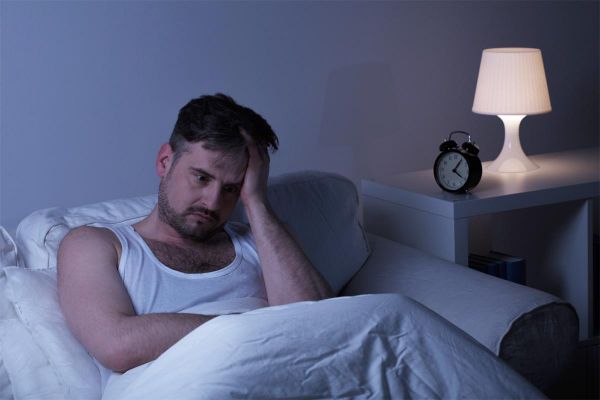 Most adults under the age of 65 need 7-9 hours of sleep each night. But, according to the CDC, 1 in 3 Americans don’t get enough sleep, with national averages hovering at about 6.5 hours per night. That’s important for a nation also struggling with an extreme prevalence of mental health disorders including depression and anxiety, both of which are heavily influenced by factors like sleep. 1 in 6 U.S. adults struggles with a mental health disorder, and these often overlap with insomnia, sleep disorders, and simply not getting enough sleep.
Most adults under the age of 65 need 7-9 hours of sleep each night. But, according to the CDC, 1 in 3 Americans don’t get enough sleep, with national averages hovering at about 6.5 hours per night. That’s important for a nation also struggling with an extreme prevalence of mental health disorders including depression and anxiety, both of which are heavily influenced by factors like sleep. 1 in 6 U.S. adults struggles with a mental health disorder, and these often overlap with insomnia, sleep disorders, and simply not getting enough sleep.
Sleep is crucial for your mental health and if you’re not getting enough, or are consistently getting far too much, you will experience negative impacts on your mental and physical health. This mostly relates to biology, where sleep plays an important role in hormone production and removal and in the protein management process. Failing to get sleep means interrupting important processes, or cutting them short, which leaves you imbalanced, irritable, and depressed or anxious.
If you or a loved one is seeking help for mental health, the Gooden Center offers a comprehensive, holistic approach. Our treatment includes a full evaluation of your mental and physical health, including sleep habits, with a personalized program to resolve issues and treat symptoms of sleep disorders alongside those of mental illness.
Prevalence of Sleep Issues in Persons with Mental Health Disorders
Harvard University reports that 80% of persons diagnosed with a mental health disorder suffer from sleep-related issues including but not limited to insomnia, interrupted sleep, hypersomnia, sleep apnea, teeth grinding, vivid dreams, increased instances of REM sleep, and others. In healthy adults, this number drops to 10-18%. While it’s poorly understood whether sleep disorders make an individual more likely to have a mental illness or a mental illness creates sleep disturbances, the answer is likely a complex interplay between the two. Persons with mental illnesses are more likely to struggle with sleep and struggling with sleep exacerbates existing issues.
Depression – 65-90% of patients with depression experience sleep problems, most notably, insomnia. Insomnia also greatly increases the risk of developing depression. In one study, patients who reported a history of insomnia were four times more likely to develop major depression over the period of their lives. In another study tracking teenagers from an early age, most reported sleep problems starting as much as 2 years before reporting symptoms of depression. Most importantly, without tackling sleep issues, patients with sleep problems are significantly more likely to continue to struggle with depression, even on medication.
Bipolar Disorder – In bipolar disorder, sleep problems are thought to be a side-effect of the disorder, as they cycle with episodes of mania and depression. In mania, most individuals don’t sleep enough. In depressive periods, most experience hypersomnia and sleep too much.
Anxiety Disorders – An estimated 50% of patients with anxiety struggle with sleep, with many experiencing insomnia relating to difficulty falling asleep. Insomnia worsens and aggravates symptoms of anxiety disorder, causing more panic irritability, and more retention of negative emotions. This can reduce the effectiveness of therapy and treatment for patients who are not also seeking out treatment for sleep problems.
ADHD – Attention deficit hyperactive disorder overlaps with sleep disorders at a regularity of 25-50%. In addition, because many of the symptoms of insomnia, including hyperactivity, inability to pay attention, and emotional instability overlap with those of ADHD, some cross-diagnosis exists. Sleep disorders and insomnia can worsen ADHD symptoms. ADHD is also highly likely to reduce sleep and quality of sleep by keeping untreated individuals awake.
Sleep has a complex interaction with mental health disorders, both because sleep disorders are caused by mental illness and because sleep problems exacerbate the symptoms of mental illness.
How Sleep Impacts Mood and Health
 Sleep is an important part of the human body. Most people need to sleep about 1/3rd of their lives to remain healthy, and mostly because sleep offers the body a period of rest and recovery. During sleep, the body moves through about 2different stages of sleep, most of which last about 90 minutes.
Sleep is an important part of the human body. Most people need to sleep about 1/3rd of their lives to remain healthy, and mostly because sleep offers the body a period of rest and recovery. During sleep, the body moves through about 2different stages of sleep, most of which last about 90 minutes.
The normal part of sleep sometimes referred to as “Quiet” sleep, the body progresses through 4 stages of increasingly deeper sleep. The temperature drops, muscles relax, and the body spends fewer resources on heart rate and breathing. These resources are shifted to hormone production during the deepest stage of sleep, where thyroid, endocrine, pituitary, and other glands produce hormones. Here, the brain also rids itself of excess protein waste, of glucose waste, and produces and manages neurotransmitters.
REM sleep, also known as REM sleep, is the period in which you dream. This stage is much less about rest, as your body temperature, heart rate, and breathing return to near-awake levels. REM sleep is important, but it can reduce the quality and quantity of deeper and more restful sleep that you get. This is especially important for individuals struggling with mental illnesses or substance use disorders, because both typically increase the quantity of REM sleep.
So, getting a good night’s sleep typically translates to feeling rested, producing hormones and neurotransmitters to balance the mood, and removing waste from the brain. If you skip it, your mood is less balanced, you’re less able to concentrate or focus, you’re more likely to be irritable, and you’re more likely to experience and dwell on negative emotions and feelings.
How to Improve Sleep for Mental Health
Most Americans struggle with sleep. Getting help can mean making lifestyle and diet changes, getting therapy, or involving sleep therapy into your existing treatment.
Lifestyle Changes
- Reduce phone and TV usage before bed
- Avoid caffeine
- Avoid alcohol
- Avoid nicotine
Maintaining Health
- Get at least 30-60 minutes of moderate exercise per day
- Take time to relax, either with a book or with meditation, yoga, or mindfulness exercises
- Set aside time to sleep, ideally with at least 2 hours of “downtime” before you fall asleep
- Practice stress management to calm thoughts and anxiety that might keep you awake
Sleep Habits
- Build regular sleep habits with a bedtime and wake-up time
- Don’t engage in stressful activities in the bedroom
- Don’t use computers or televisions that might keep you awake in the bedroom
- Limit phone time in the bedroom
Many people also benefit from professional therapy, including wakefulness therapy, cognitive behavioral therapy, and other behavioral therapies. These therapies tie into the idea that insomnia, or the behaviors contributing to it, are learned, and you can unlearn them and learn healthy habits in their place. These habits might require staying awake and controlling how much you’re allowed to sleep, they might include retraining how you’re allowed to think about and process stress, and they might include new reactions to feeling stressed or anxious in bed. Most people have complex personal reasons for failing to sleep, but a personalized treatment program is designed to recognize and tackle those specific problems so that the individual can learn how to fall asleep and consistently get enough rest.
Sleep greatly impacts mental health. If you aren’t getting enough, it may be time to ask for help, especially if you’re struggling with anxiety, depression, or another mental health disorder.